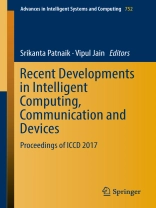This book offers a collection of high-quality, peer-reviewed research papers presented at the International Conference on Intelligent Computing, Communication and Devices (ICCD 2017), discussing all dimensions of intelligent sciences – intelligent computing, intelligent communication, and intelligent devices.
Intelligent computing addresses areas such as intelligent and distributed computing, intelligent grid and cloud computing, internet of things, soft computing and engineering applications, data mining and knowledge discovery, semantic and web technology, hybrid systems, agent computing, bioinformatics, and recommendation systems. Intelligent communication is concerned with communication and network technologies, such as mobile broadband and all optical networks that are the key to groundbreaking inventions of intelligent communication technologies. It includes communication hardware, software and networked intelligence, mobile technologies, machine-to-machine communication networks, speech and natural language processing, routing techniques and network analytics, wireless ad hoc and sensor networks, communications and information security, signal, image and video processing, network management, and traffic engineering. Lastly, intelligent devices are any equipment, instruments, or machines that have their own computing capability. As computing technology becomes more advanced and less expensive, it can be incorporated an increasing number of devices of all kinds. This area covers such as embedded systems, radiofrequency identification (RFID), radiofrequency microelectromechanical system (RF MEMS), very-large-scale integration (VLSI) design and electronic devices, analog and mixed-signal integrated circuit (IC) design and testing, microelectromechanical system (MEMS) and microsystems, solar cells and photonics, nanodevices, single electron and spintronics devices, space electronics, and intelligent robotics.
Содержание
Interactive Browsing of Large Image Repositories.- Study on Total Factor Productivity of Nanshan District in Shenzhen.- Review of Domestic and Foreign Research on the Elderly’s Use of Mobile Phones.- Research on Face Detection Based on Fast R – CNN.- KCF Tracking Algorithm Based on Outlier Detection.- Salmon Migration Optimization: A Novel Nature-Inspired Algorithm.- Lyapunov Inequality for Conformable Fractional Equation.- Integrated Simulation Design of UAV System.- Population Prediction Based on the Multi-Models and Comparison Research.- A Method of Time-frequency Analysis and Feature Extracts of Microseism Signal.- A Statistical Translation Approach by Network Model.- A Method for Identifying Microseism Signals Based on Data Mining.- Survey on fractality in Complex Networks.- Sound Detection and Alarm System of Unmanned Aerial Vehicle.- Student Learning Simulation Process with Petri Nets.- The Digital Measures for Protection and Heritage of Dongba Culture.- Application of Improved Wavelet Neural Network in Traffic Prediction of Smart Substation.
Об авторе
Dr. Srikanta Patnaik is a professor at the Department of Computer Science and Engineering, Faculty of Engineering and Technology, Siksha ‘O’ Anusandhan (SOA) University, Bhubaneswar, India. He has received his Ph.D. (Engineering) in Computational Intelligence from Jadavpur University, Kolkata, India, in 1999 and has supervised 12 Ph.D. theses and more than 30 M.Tech theses in the area of computational intelligence, soft computing applications and re-engineering. Dr. Patnaik has published 60 research papers in international journals and conference proceedings. He is the author of 2 textbooks and has edited 12 books and a number of invited book chapters published by leading international publishers like Springer-Verlag and Kluwer Academic. Dr. Patnaik was the principal investigator of the AICTE-sponsored TAPTEC project “Building Cognition for Intelligent Robots” and the UGC-sponsored Major Research Project “Machine Learning and Perception using Cognition Methods”. He is the editor-in-chief of the International Journal of Information and Communication Technology and the International Journal of Computational Vision and Robotics, and also the editor-in-chief of the book series “Modeling and Optimization in Science and Technology” published by Springer, Germany.
Dr. Vipul Jain works in the area of operations and supply chain management at the Victoria Business School, Victoria University of Wellington, New Zealand. He has worked as a researcher for the French National Institute for Research in Computer Science and Control in Nancy, France, and was also involved in the European project I*PROMS (Innovative Production Machines and Systems) in the UK. Vipul has written more than 85 archival publications in high impact factor journals, as well as conference papers and books chapters. He is the editor-in-chief of the International Journal of Intelligent Enterprise, and an editorial board member for seven international journals. Vipul is ranked 7th in a list of the top 20 leading Indian academicians publishing in the area of Logistics and Supply Chain management. He was involved in an exhaustive study entitled “Analysis of the Logistics research in India – White paper (2012)” conducted by researchers from the Institute of Transport Logistics, Dortmund University, Institute for Supply Chain and Network Management, Technische Universität Darmstadt, and University of Münster, Germany. Vipul is a scientific and advisory committee member for various international conferences. He was the programme coordinator for the Masters in Industrial Engineering Programme at IIT Delhi, India, and has been actively involved in conducting management development and training programmes for senior managers and executives of public and private organisations in India on various issues and challenges encountered in operations, logistics, and supply chain management.












